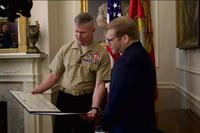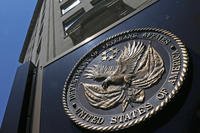"I thought the name of this web site was Defense Tech?" asks JD, echoing the e-mails of several folks who wrote in over the weekend. "Enough with your personal political views about Katrina. This is not the place for it."
With all respect, JD, I have to disagree. This isn't about politics. This is about all of our safety. Katrina, and the response to Katrina, has become a national security issue maybe the biggest one the country has faced since 9/11. As the editor of a website devoted to the future of national security, I can't and won't avoid something so important. It wouldn't be right. After the September 11th attacks, the Department of Homeland Security was put together with two major goals in mind: deter further terrorist strikes, and respond to disasters, both natural and man-made -- since the evacuation plans, medical responses, and the like are largely the same in either case.
After the September 11th attacks, the Department of Homeland Security was put together with two major goals in mind: deter further terrorist strikes, and respond to disasters, both natural and man-made -- since the evacuation plans, medical responses, and the like are largely the same in either case.
Four years and countless billions of dollars later, we've seen a clumsy, ten-thumbed response from DHS. Ships and troops were delayed for days before they were ordered to the disaster zone. Tens of thousands were left stranded, without food or water or medical care, while relief agencies were turned away.
All this, after a disaster everyone knew was coming. Now, imagine what would have happened after a surprise attack. Al Qaeda operatives have to be wondering the same thing. It's as if we've hung a giant "kick me" sign around the nation's neck. No wonder Republicans from President Bush to Newt Gingrich to Joe Scarborough have all called the federal effort "not acceptable."
In the last few days, some have tried to shift the blame onto the state and city authorities. A whole bunch of it is well-deserved. The locals had more than their fare share of screw-ups. As one homeland security source told me:
NOLA [city officials] should not have allowed that many folks to stay in a shelter of last resort. Why didn't they get those people out? Plus, the shelter was fucked up. No supplies and no sanitation. Plus, why did they let special needs (ederly, infants, medically unfit) into the shelter. Those people should have gotten out. The feds would have provided tons of buses and transportation if the need had been identified early on....like years ago.
But the City of New Orleans' ability to cope with a crisis isn't a matter of national security. The Department of Homeland Security's ability is. Ray Nagin isn't going to be responding to terrorist attacks. That's what DHS Secretary Michael Chertoff and his team have been hired to do.
THERE'S MORE: With fingers pointing in so many directions, there's been some question about whether the Feds or the locals are in charge after a catastrophe. Here's what the U. S. Department of Homeland Security Strategic Plan has to say about the DHS' role:
Response -- Lead, manage and coordinate the national response to acts of terrorism, natural disasters, or other emergencies.
Recovery -- Lead national, state, local and private sector efforts to restore services and rebuild communities after acts of terrorism, natural disasters, or other emergencies.
Does DHS need the locals' permission in order to act? Nope, says the Department's National Response Plan. In fact, the document calls for a "proactive Federal response to catastrophic events."
A catastrophic event is any natural or manmade incident, including terrorism, that results in extraordinary levels of mass casualties, damage, or disruption severely affecting the population, infrastructure, environment, economy, national morale, and/or government functions. A catastrophic event could result in sustained national impacts over a prolonged period of time; almost immediately exceeds resources normally available to State, local, tribal, and private-sector authorities in the impacted area; and significantly interrupts governmental operations and emergency services to such an extent that national security could be threatened. All catastrophic events are Incidents of National Significance...
Guiding principles for proactive Federal response include the following:
■ The primary mission is to save lives; protect critical infrastructure, property, and the environment; contain the event; and preserve national security.
■ Standard procedures regarding requests for assistance may be expedited or, under extreme circumstances, suspended in the immediate aftermath of an event of catastrophic magnitude.
■ Identified Federal response resources will deploy and begin necessary operations as required to commence life-safety activities.
■ Notification and full coordination with States will occur, but the coordination process must not delay or impede the rapid deployment and use of critical resources. States are urged to notify and coordinate with local governments regarding a proactive Federal response.
■ State and local governments are encouraged to conduct collaborative planning with the Federal Government as a part of "steady-state" preparedness for catastrophic incidents.
(Big ups: TPM Cafe)








